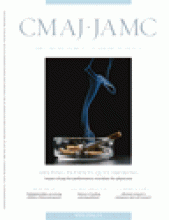- © 2007 Canadian Medical Association
New portal: The World Health Organization has unveiled a new Clinical Trial Search Portal designed to help physicians, researchers and consumers navigate their way through the exploding battery of clinical trial registers. The portal “facilitates the identification of all clinical trials, regardless of whether or not they have been published,” WHO Assistant Director General, Information Evidence and Research, Tim Evans said, adding that it constitutes “an enormous step toward greater access, transparency and accountability of health research globally.” The portal can be accessed at www.who.int/trialsearch/

Figure. Photo by: www.comstock.com
Lunchless: The No Free Lunch Directory (US version only) has gone online to provide patients with access to a database of health care professionals — physicians, pharmacists, nurse practitioners, nurse–midwives and others — who have taken “The Pledge” to disdain handouts and gifts from industry. The database is searchable by specialty, city, state and zip code but does not yet include Canadians who have taken the plunge, although the nonprofit corporation, headed by New York City internist Bob Goodman, plans to soon expand into Canada. Goodman says professionals from 42 states and 27 countries have taken The Pledge, and that the number of Canadians to have done so is second only to Americans (http://nofreelunch.org).
Wild Rose approval: Some 91% of Alberta's doctors voted to approve a trilateral fiscal agreement between the Alberta Medical Association, the provincial government and the province's 9 health regions that increases their fee schedule by 9% over 2 years, creates a $56.5 million clinical stabilization fund and establishes a $103.5 million pot to cover skyrocketing overhead costs, while paying physicians an annual 2.8% retention bonus (CMAJ 2007;176[8]:1073-74).
Chaoulli Ontario: Newmarket auto body shop owner Lindsay McCreith has launched a constitutional challenge to Ontario's Health Insurance Act and the Commitment to the Future of Medicare Act for prohibiting private health insurance for medically necessary services. Told that he had to wait 4.5 months to obtain an MRI to determine whether his brain tumour was malignant and then, potentially, another 8 months for surgery, McCreith paid $40 000 for treatment in the United States. McCreith contends that failure to provide timely access to health care violated his Charter right to “life, liberty and security of the person.”








